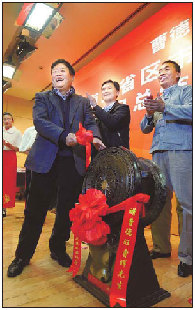
Cao Dewang (left) and son Cao Hui donated 200 million yuan for drought relief in Southwest China last May. They attached strings of accountability to their gift.
'Most demanding donors'
Some financial-savvy donors have started to wield their large wallets and budgeting knowledge to monitor how charitable funds are handled.
 |
|
Cao Dewang (left) and son Cao Hui donated 200 million yuan for drought relief in Southwest China last May. They attached strings of accountability to their gift. |
Cao Dewang, chairman of the Fuyao Glass Group in Fujian province, and his son, Cao Hui, wanted more accountability that their money would be spent the way they wanted.
They donated 200 million yuan last May to people in Southwest China who were severely hit by a drought. An estimated 100,000 poverty-stricken households in the region benefited from the relief funds through water and food provisions, which were managed by the China Foundation for Poverty Alleviation. Each household got 2,000 yuan.
Cao and his son signed an agreement with the foundation saying it must distribute the relief funds locally within six months. The management fee was set at 3 percent of donations, far less than the normal 10 percent, and Cao specified that any loss during the distribution process was intolerable. Cao also hired a monitoring committee to oversee the use of his donation.
"I knew that people were suffering from the dry spell because my teenage life was tough as well. The 2,000 yuan might help them step out of difficult times," Cao said.
"The agreement does not show I don't trust the foundation," he said, "because the agreement functions as a constraint for the foundation and also local governments. No money will be taken away; all money will go to the needy."
According to the agreement, Cao also hired an agency to sample 10 percent of beneficiary families at random after the donation was given out. If more than 1 percent of the families were found to be unqualified, the foundation had to pay back the fund at 30 times the amount that was misspent.
The news media dubbed the Caos "the most demanding donors in history". But by February 2011, the donation of 200 million yuan had been distributed as scheduled. Cao said it proved that he did the right thing to have an agreement for money distribution.
"Cao Dewang's personal demand to the China Foundation for Poverty Alleviation actually pushed the organization to improve its professional service," said Cheng Chuanjin, professor at the Research Center of Philanthropy and Social Enterprise, school of social development and public policy, at Beijing Normal University.